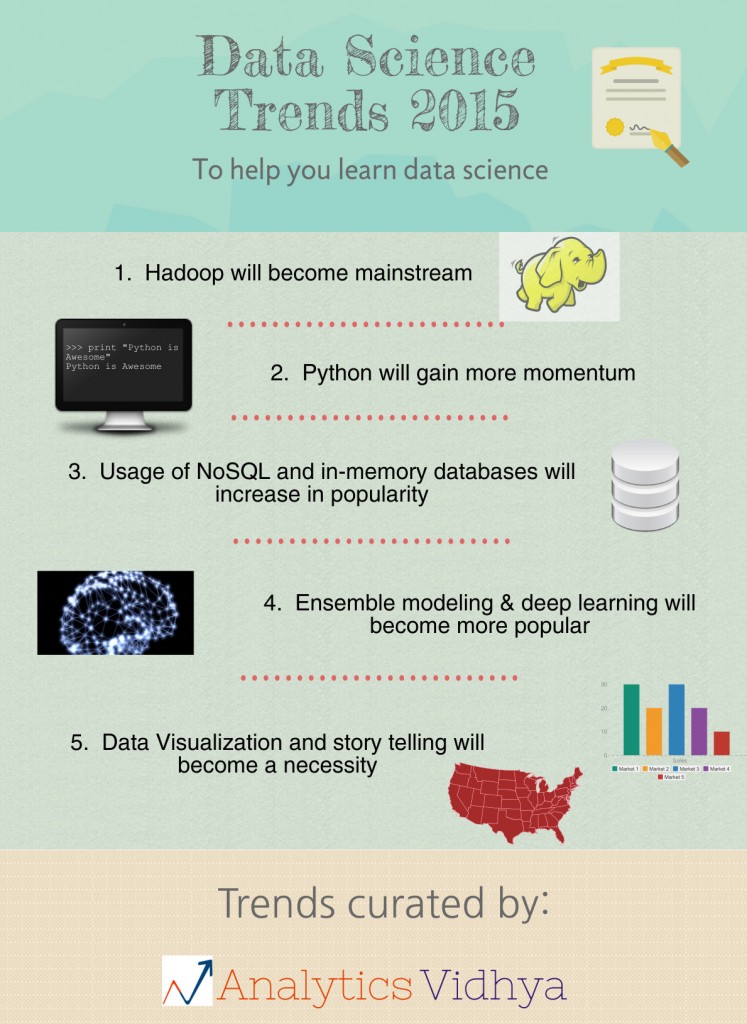2014 is coming to an end shortly. What a glorious year it has been for technology and data science! Constant change, better products, faster solutions, new technologies – all of this happened with breath taking pace. If activities in recent months are any thing to go by, next 12 months are going to be nerve wrecking as well.
While there are many posts talking about technology trends in 2015, there is none focusing on learning data science! I usually review my learning plan every few months and start of new year is definitely one such point. So, I thought it might be a good idea to pen down the trends on changing data science landscape for 2015. You can use them to prepare your learning agenda for 2015.
Whom are these trends for?
Let’s be clear – these trends are not tech trends. So, I am not predicting which technologies are going to grow or stay and which are going out.
I am listing trends on how I expect the demand for various skill sets will change over the next 12 months. The aim is to help people draft their learning agendas for the next 12 months.
Infographic depicting 2015 trends:
1. Hadoop will become mainstream
Developments in Hadoop ecosystem were probably the technology highlight of 2014. I expect Hadoop skills to stay and become more hot as 2015 arrives and evolves. It will also continue to be a highlight for 2015, with a wide range of startups trying to make Hadoop more mainstream and accessible.
The shortage of Hadoop resources is set to increase further as more and more Organizations test out Hadoop eco-system. A must have on your learning agenda, especially so, if you hold some experience on data science under your belt. These skills might be the ones which propel your career at a different pace.
2. Python will gain more momentum
Python has gained significant momentum in data science community over last couple of years. Libraries like NumPy, SciPy and Pandas have transformed applications of Python for data science. I expect this momentum to grow further this year. Python is very versatile and hence I expect the trend of increased momentum for Python is here to stay.
Please note that I am not sparking a Python vs. R discussion here. If you want to have a look at that, you can read my views here. I expect that R will also gain prominence, but the growth of Python adaption would be higher. So, if you are looking to learn one open source language for data science, my recommendation would be Python over R.
3. Usage of NoSQL and in-memory databases will increase in popularity
The database technology has been evolving continuously over time. I still remember firing my initial queries on a Teradata powered database and being surprised at it’s speed over some of the traditional databases we were using at that time. Today NoSQL databases like MongoDB and Neo4j are revolutionizing this space again. These databases allow smarter and faster searches like never before.
This is further going to change with in memory databases like Aerospike, Mem-SQL and VoltDB are changing the way we think about data retrieval. What should it mean for your learning agenda? I would definitely include MongoDB or Neo4j, if you don’t know them and keep a close eye on how in memory database evolve in 2015.
4. Ensemble modeling & deep learning will become more popular
Take any competition on Kaggle and the chances are that the winning algorithm was either an ensemble model or a deep learning algorithm. What bigger proof do you need about the applications of these techniques. A must learn, if you already don’t know them. If there is an inch of doubt on their effectiveness, go and check the Kaggle forums for yourself!
5. Data Visualization and story telling will become a necessity
Gone are those days when you could rely only on a few people to narrate data stories. Today, every analyst needs to be a story teller. He needs to be able to think of best ways to visualizing and representing information such that huge data becomes easy to digest. Thankfully, tools like Tableau and QlikView / QlikSense come in handy here. Both of them have added a story telling feature to their product suite in 2014.
End Notes:
These were the trends I expect will play out in 2015. With less than 15 days remaining before 2014 ends, it might be the right time to have a look at what you need to learn in 2015. For the people, who like to keep (or try to keep) resolutions, there is enough food for thought here!
What do you think about these trends? Do you have any other suggestions, which should make it to this list? If yes, do share them with us and if they are actually relevant, we will add it to this list.







Hi Kunal, While mentioning R vs Python discussion, I guess you forgot to link the article there.
And by the way that's again great curation as always. :)
Glad you liked it and thanks for pointing it out the missing link. Have added the link now!
Hi Kunal, Am I right in saying that demand for SAS/Tableau/Spotfire/Microstrategy will grow in India atleast? Because based on my experience in interviews, companies want people with experience in multiple tools which I have mentioned above. Unfortunately, this experience hurdle and lack of knowledge in Tableau/Spotfire is preventing newbies like me to enter into this field. Could you please provide some tips on the same?